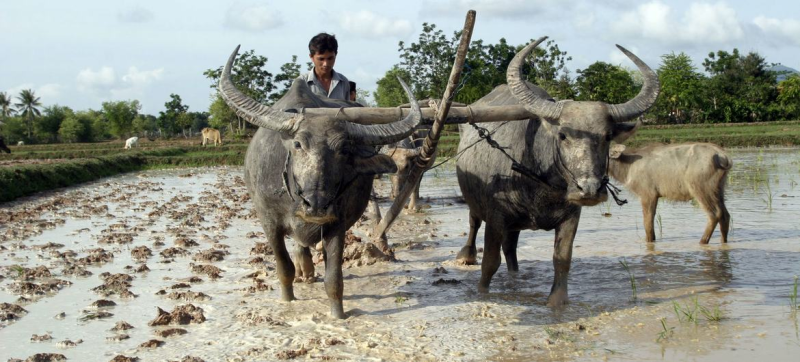- India Sees 9% Drop in Foreign Tourists as Bangladesh Visits Plunge |
- Dhaka Urges Restraint in Pakistan-Afghan War |
- Guterres Urges Action on Safe Migration Pact |
- OpenAI Raises $110B in Amazon-Led Funding |
- Puppet show enchants Children as Boi Mela comes alive on day 2 |
Young Farmers Locked Out as Land Access, Jobs Decline

A young farmer plows a paddy field with buffaloes in Kandal province, Cambodia.
Agricultural land is more than just a resource to produce food – for many older adults around the world, a land deed is the only safety net they have as they enter old age. As a result, they hold onto it tightly.
However, this creates challenges by limiting land access for the next generation and diminishing their voice in agricultural policymaking. Without land assets, young people struggle to secure the resources needed to become agricultural producers themselves.
Between 2005 and 2021, the number of youth employed in agrifood jobs declined by 10 per cent, prompting concerns for food production worldwide.
This is the challenge examined by the UN Food and Agriculture Organization (FAO)’s inaugural report on youth in agrifood systems. Released on Thursday, the report offers insights into the status of youth producers and the challenges they face.
“Because youth are the next generation of producers, consumers, processors of food, and service providers, it is really important to understand how they can benefit from and contribute to agrifood systems,” said Lauren Phillips, Deputy Director of Rural Transformation and Gender Equality at FAO.
With over 1.3 billion people worldwide between the ages of 15 and 24 – and 46 per cent of them living in rural areas – youth can be “key agents of change” for the agrifood sector, which is responsible for producing, processing, and transporting the food that sustains the world.
Agrifood systems currently employ 44 per cent of working youth, especially in low- and lower-middle-income countries, where 85 per cent of the world’s youth in that age range reside.
However, over 20 per cent of youth are not in formal employment, education, or training, meaning that their potential contribution to agrifood and other economic sectors is underutilised.
Ending worldwide unemployment for these young people could generate $1.5 trillion for the global GDP, $670 billion of which would come from the agrifood sector alone.
“Young people can drive economic transformation and global prosperity,” said QU Dongyu, Director-General of FAO.
While youth are “key agents of change” for the agrifood sector and the global economy writ large, according to the report, they also face many challenges in realising this potential.
The next generation of agrifood producers will confront a growing global population requiring more food, alongside increasing climate shocks threatening food supplies.
FAO estimates that 395 million youth live in rural areas expected to see declines in agricultural productivity due to climate impacts.
Despite large numbers employed in agrifood, most youth work in vulnerable jobs: 91 per cent of young women and 83 per cent of young men hold positions that often offer few benefits and are seasonal.
Low wages and hazardous conditions discourage continued employment and drive migration to urban centres.
“Policies really need to make sure that they invest in preparing young people with skills and education so that they can have decent jobs in agrifood systems,” Ms. Phillips said.
One major barrier for youth aspiring to become producers is lack of social and financial capital – policymakers often overlook youth voices, and young people struggle to access loans, banking services, and land deeds.
Youth involvement in policymaking can sometimes feel “tokenistic.” The report highlights that collective action—whether through informal networks or formal unions and cooperatives—can amplify youth voices.
It also calls for expanded training and restructuring financial systems to improve access for young people.
“FAO is unconditionally committed to stepping up its work with and for youth to ensure their voices are heard and that their participation in and contribution to sustainable and inclusive agrifood systems are fully harnessed,” said FAO Director-General QU.

